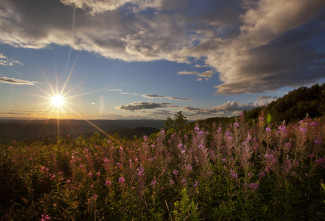
Johns Hopkins UniversityEst. 1876
America’s First Research University
Entangled Lives: Labor, Livelihood, and Landscapes of Change in Rural Massachusetts

Among the most powerful artifacts I know of early American women’s work isn’t an artifact at all. It is the darkened wood around some eighteenth-century flooring, shown to me many years ago now by an architectural conservator at work in the Porter-Phelps-Huntington House (Forty Acres) in Hadley, Massachusetts. I had spent a lot of time in and around that site in the course of my research, working to recover insight into the lives of the women whose labors had made the household run, and I had seen plenty of tools—spinning wheels, churns, and so forth—associated with their work. But this was different. The discolored wood, now hidden away in a storage space, was a remnant of hundreds of scrubbings. The chapped hands that created this evidence may well have never held a pen, but they nonetheless left me this testimony of their labor.
For historians eager to understand the lives of working women in the early republic, artifacts—from household goods to agricultural tools to entire cultural landscapes—are sometimes the only way to find our way into lives too rarely preserved in archival records, or preserved only as they appeared from the perspectives of their employers. In the course of earlier research and writing, I had contemplated what the changing floorplans of Forty Acres might suggest about the entangled lives that unfolded within them; now, in this book project, I have had the opportunity to extend that contemplation and think further about what objects and landscapes can tell us about women’s work in the half-century following the American Revolution.
Entangled Lives, as it strives to reconstruct shifting social relations of labor across this single community in the half-century following the American Revolution, works hard to tap insight that resides in the built environment and material culture of the New England past. Deep dives into the probate records conjure images of baskets woven by native hands, cheesecloths stashed in cupboards, and sheets too soiled to be saved. The pages contemplate tavern kitchens with basins to be filled and mugs to be washed—as well as trundle beds to be built, made up, and stored away again, and collapsible walls to be brought out or folded away. The book examines women’s work in the dairy, in domestic service, in clothmaking and hospitality work, and in the work of healthcare, with an eye to considering how different women’s roles in those efforts—to quote a phrase from my first book on women in the clothing trades, both 'brought women together, and set them apart.'

The book concludes with another kind of contemplation, about local historical memory and the survival of those objects for scholarly scrutiny today. A coda considers how we know, or think we know, about women like those of early Hadley—shaped as it necessarily is through the lens of previous generations of pastkeepers. In the nineteenth and twentieth centuries, women and men in Hadley and beyond championed certain ideas about the past that led them to preserve some artifacts, records, buildings, and landscapes, and let others go. Those decades of decision-making have shaped how everyday audiences have come to understand the early American past, while also shaping the archival and artifactual record from which those histories are written. As a public historian and public history educator, it is important to me to connect the early American past to the histories of pastkeeping through which we now see, understand, and interpret it.
All in all, this project seeks to remind us how deeply entangled these eighteenth-century lives were, creating the fabric of community, but also how our lives today continue to be entangled with those that preceded us on this land, and of course how our contemporary lives are inextricably entwined with the labor of others near and far, seen and unseen. My aim here, as always, is to make more visible workers whose energy, skill, and time is present but often hidden in the tangible world around us.
Order Entangled Lives: Labor, Livelihood, and Landscapes of Change in Rural Massachusetts – published on December 17, 2019 – at the following link: https://jhupbooks.press.jhu.edu/title/entangled-lives
Marla R. Miller is the director of the Public History Program and a professor of history at the University of Massachusetts Amherst. She is the author of Entangled Lives: Labor, Livelihood, and Landscapes of Change in Rural Massachusetts, The Needle's Eye: Women and Work in the Age of Revolution, and Betsy Ross and the Making of America.



